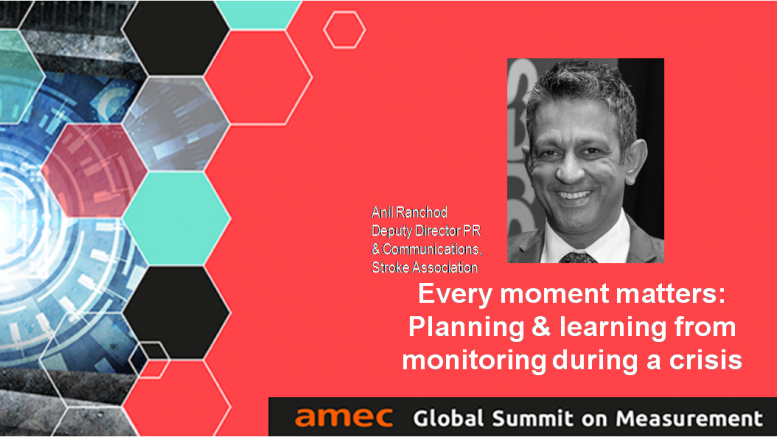The ongoing COVID-19 pandemic is having a significant impact in countries around the world. Response priorities include protecting the safety and health security of the global workforce, ensuring that the life-saving mission is continued.
Focusing on “Every moment matters: Planning & learning from monitoring during a crisis” was Anil Ranchod, Deputy Director, PR and Communications, The Stroke Association. He spoke about how the Stroke Association responded to Covid-19 pandemic and the importance of monitoring, measuring and assessing communications during this time – to create impact. The corporate strategy goals they had put in place in 2019, were driving intense work, building insights and developing delivery plans to achieve the goals. “And, then the lockdown happened on March 23rd and everything changed. UK came to a standstill,” he said. This led to fear and panic with the government issuing confusing messages to the people.
What was the impact?
The fund-raising activities, one of their biggest activities came to a halt. Research was put on hold. Against a background of organising many events like the London Marathon, the scene now was changed and they used the month to step into intense engagement with the public. “The impact of managing a team presented its own challenges,” he explained. Their external communication group, which had to align and fit ‘purpose’ for audiences, reviewed and planned activities in the light of what audience they were expecting; plus they revised and updated plans too. They created a COVID-19 page on their website, which was updated daily; the CEO set up emails daily, to encourage everyone to take care of themselves; they kept the C-Suite updated too.
Why prioritising in a crisis matters and how? This is what guided their activities, as prioritising is key, after which the plan falls into place.
And, against the light of the growing pandemic, what was wrong? The hospital admissions dropped 50%, the stroke patient numbers went down and the need to get people to dial 999 was down. So they created a campaign on April 8, 2020, generated a news story, a short film, included social media and secured a spokesperson too. The message highlighted that stroke is an emergency and they activated – Act FAST & Call 999 facility. The result? Over 200 articles appeared, emphasising the fact that stroke is still an emergency.
“We worked with NHS,” he said and started the ‘Open for Biz’ campaign highlighting all emergency health conditions. Then a social media campaign was launched on April 23 – with the message – ‘Help us help u, Get the treatment you need’.
He also covered monitoring and measuring outcomes and impact – the what, when, how, why and who that revolved around the situation. Having identified the fact that they were not able to reach the older audiences, they targeted them through social media and monitored the performance outcomes every week. “It’s most important that you don’t forget the ‘who’ – your team, and without them you cannot succeed!” he pointed out. A Whatsapp group was set up which proved to be “immeasurably valuable, making sure that the team was able to work and deliver.
Key issues
The key issues were – prioritise first, keep distractions in sight, be agile and ready to adapt, and then review and revise. “Look, listen and learn, for fortune favours the brave,” he quipped.
Regarding the media coverage, there were peak times – like there was a spike around April 25; and social media coverage spanned Twitter, LinkedIn, Instagram, Facebook, which helped them gain traction. Interestingly, they got several mentions in the PM’s announcements too.
In conclusion, he thought they were “successful”. “We do believe, we saved lives,” he admitted. The takeaways were: Know your priorities and always help your audience in need, be the conscience of your organisation, monitor, assess, review and revise. “Don’t forget, be agile,” was his parting shot.
The views and opinions published here belong to the author and do not necessarily reflect the views and opinions of the publisher.






Be the first to comment on "Every moment matters: Planning & learning from monitoring during a crisis"